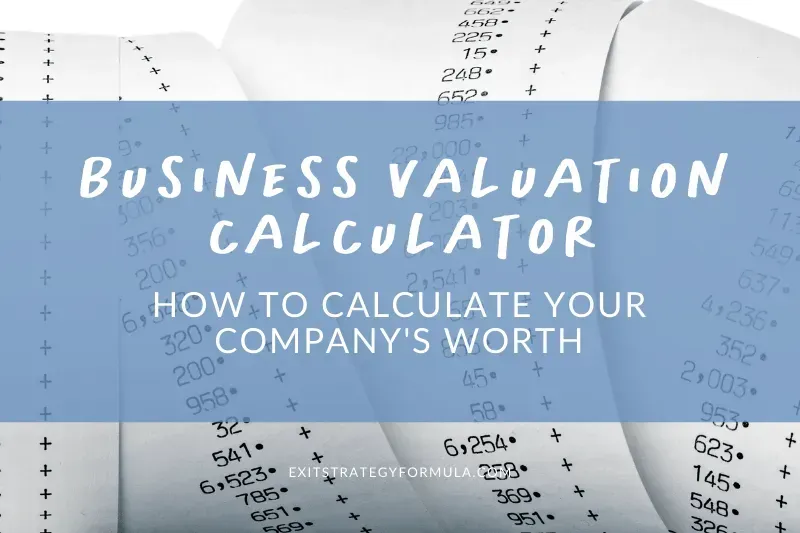
Business Valuation Calculator: Free Worth Estimator Template
Ever wonder what your business is really worth? For small business owners, determining business value can feel kinda like trying to solve a puzzle blindfolded. While online calculators can give you a rough estimate, understanding the true value of your company requires careful analysis. Whether you're considering selling, seeking investment, or just want to understand your company's worth for planning purposes, getting an accurate business valuation is crucial for making informed decisions.
Want to get started right away? Download our free business valuation calculator here to get a simplified valuation range for your business.
Table of Contents
Understanding Your Business Worth: A Quick Guide
Our Free Tool for Valuing a Company: Calculator Overview
Owner's Compensation Adjustment:
A Business Owner's Guide to Valuation Methods
Popular Business Valuation Approaches
Making Essential Valuation Adjustments
Common Business Valuation Mistakes to Avoid
What is the formula for valuing a company?
How do you calculate how much a company is worth?
How much is a business worth with $100,000 in sales?
Understanding Your Business Worth: A Quick Guide
The value of a business isn't just about annual profits or current-year revenue. Think of business worth kinda like an iceberg - what you see above water (your financial statements) is only part of the picture. Below the surface, factors like market position, growth potential, and predictable key drivers significantly impact what potential buyers might pay.

For small and medium-sized businesses, particularly those with annual sales between $500,000 and $5 million, understanding these value drivers is essential. Managing interest expenses and tax planning can significantly impact your bottom line. A retail business might sell for a different multiple than professional services firms. Even typically, restaurants within the same area can have widely different values based on their cash flow, leaseholds and relative risk.
Several key factors influence your business value:
Stability of earnings over the past three years
Customer concentration and recurring revenue
Market position and competitive advantages
Quality of business assets and systems
Strength of your management team
Our Free Tool for Valuing a Company: Calculator Overview
Our valuing a company calculator helps business owners get beyond a rough estimate to understand their business worth. Unlike complex financial models that can be overwhelming, our business valuation calculator focuses on the metrics that matter most to potential buyers.
Here's exactly what you'll enter:
Annual Revenue:
Include all sales from your core continuing business operations. For most small and medium-sized businesses, we recommend using the most recent 12 months of sales data.
Cost of Goods Sold:
Enter direct costs related to delivering your products or services. These typically include materials, direct labor, and any costs that vary with sales volume.
Operating Expenses:
Include regular business expenses like rent, utilities, and administrative salaries. Don't include interest payments or taxes yet - we'll adjust for those separately. Don't worry about excess compensation or one-time expenses yet - we'll adjust for those separately.
Owner's Compensation Adjustment:
Many business owners run excess compensation through their businesses. Consider the amount above what you'd pay someone else to do your job.
One-time Expenses:
Include costs that won't continue under new ownership, such as legal settlements, moving costs or non-recurring repairs.
The calculator then provides:
Normalized earnings (adjusted EBITDA)
Industry-specific multiple ranges
Estimated value range for your business assets

It's important to understand that business valuations aren't fixed numbers - they exist within a range. Generally, larger businesses command higher multiples than smaller ones due to factors like market position, economies of scale, and lower risk profiles. A small business might sell for 2-3 times EBITDA, while larger companies in the same industry could fetch 6-8 times or more. This calculator provides a starting point by using industry-standard multiples, but remember that your business's unique characteristics, market conditions, and buyer dynamics will ultimately influence its final value in a transaction.
A Business Owner's Guide to Valuation Methods
Understanding different valuation approaches helps you make sense of what drives business value in your industry. Let's explore how each method works and when to use it.
Multiple of Earnings Method
This business-based approach uses your years earnings multiplied by an industry factor. For example, a stable business with lower risk might command a multiple of 3-4 times earnings, while a more volatile business with a high percentage seasonal revenue might sell for 1-2 times earnings.
The multiple depends on factors like:
Industry standards
Business size
Growth rate
Revenue stability
Market conditions
Asset-Based Valuation
This method calculates total value by assessing your business assets and subtracting liabilities. It's particularly relevant for businesses with significant tangible assets or companies operating at a loss. Don't forget to consider the tax implications of asset valuations - a financial professional can help navigate these complexities.
Physical Assets:
Equipment and machinery
Inventory
Real estate
Vehicles
Financial Assets:
Cash and investments
Accounts receivable
Prepaid expenses
Intangible Assets:
Customer relationships
Intellectual property
Brand value
Goodwill
Popular Business Valuation Approaches
Beyond basic methods, there are several sophisticated approaches to determining business value. The discounted cash flow method, for example, calculates present value by projecting future earnings and applying an anticipated rate of return. This approach assumes perpetuity or estimates value over a specific timeframe.
Market comparison methods look at recent sales of similar businesses, adjusting for differences in size, market, and performance. While you can research comparable sales yourself, a financial professional can help analyze market data and account for interest rates, economic conditions, and industry trends that impact value. This approach works best when you can find comparable sales in your industry.
For companies with predictable key drivers, valuation might focus more heavily on:
Recurring revenue streams
Long-term contracts
Market share
Proprietary technology
Making Essential Valuation Adjustments
Accurate business valuations require several critical adjustments to determine true earnings power:
Normalizing Earnings:
Remove excess compensation above market rates
Adjust for interest and taxes to get a clear EBITDA figure
Account for related party transactions
Standardize accounting methods
Working Capital:
Assess typical inventory levels
Review accounts receivable efficiency
Consider necessary cash reserves
Adjust for seasonal variations
Risk Factors:
Customer concentration
Supplier dependencies
Key employee reliance
Market competition
Common Business Valuation Mistakes to Avoid

When calculating your business value, watch out for these common pitfalls:
Financial Adjustments:
Using unadjusted profit figures
Overlooking necessary working capital
Misunderstanding business enterprise value vs. equity value
Failing to normalize expenses
Market Analysis:
Applying incorrect industry multiples
Ignoring local market conditions
Missing key value drivers
Overestimating growth potential
Frequently Asked Questions
What is the formula for valuing a company?
The basic formula for valuing a company is Adjusted EBITDA × Industry Multiple. However, the specific multiple varies by industry and company characteristics. For stable businesses, multiples typically range from 2-4 times adjusted earnings, while high-growth companies might command higher multiples.
How do you calculate how much a company is worth?
To calculate company worth, start by determining your adjusted earnings before interest, taxes, depreciation and amortization (EBITDA). Then multiply this figure by an appropriate industry multiple. For example, if your adjusted EBITDA is $500,000 and your industry multiple is 3, your business value estimate would be $1.5 million.
How much is a business worth with $100,000 in sales?
A business's value isn't determined by sales alone but by its profitability and industry. A business with $100,000 in sales could be worth anywhere from $50,000 to $300,000 depending on its profit margins, industry, growth rate, and assets. The key is understanding what portion of those sales converts to actual profit.
How do you determine the value of a company?
Determining company value requires analyzing several factors:
Calculate adjusted annual earnings
Apply appropriate industry multiples
Consider business assets
Evaluate market conditions
Assess growth potential
Review customer concentration Start with our free calculator to get an initial estimate based on these factors.
Next Steps
Ready to understand what your business is worth?

Download our free business valuation calculator to:
Get an initial value estimate
Understand key value drivers
Compare industry multiples
Plan for potential sale
Get your free calculator at exitstrategyformula.com/free-valuation-calculator.com and take the first step toward understanding your company's true worth.
Remember, while a calculator provides valuable insights, it's just one tool in the valuation process. The key is understanding what drives value in your specific industry and business model.
© 2022 Julia Kwinter. All Rights Reserved.


